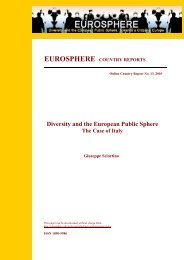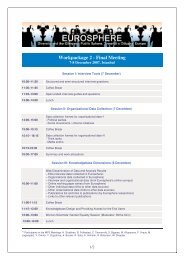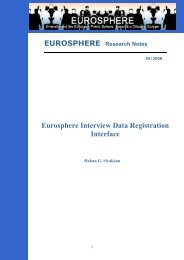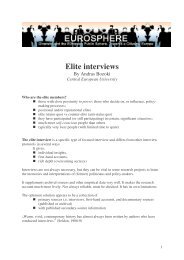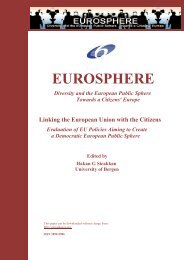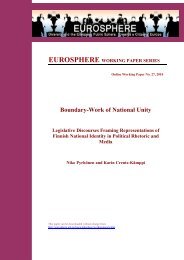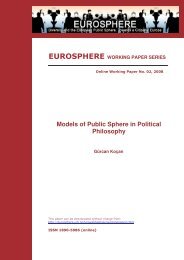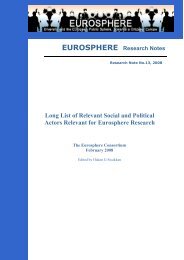Migrants, Minorities, Belongings and Citizenship. Glocalization and ...
Migrants, Minorities, Belongings and Citizenship. Glocalization and ...
Migrants, Minorities, Belongings and Citizenship. Glocalization and ...
Create successful ePaper yourself
Turn your PDF publications into a flip-book with our unique Google optimized e-Paper software.
has validity within the span of the glocal spaces it investigated; <strong>and</strong> further research is<br />
needed to validate its policy-relevant results.<br />
One finding in Glocalmig concerns the situations of people with high degrees of mind<br />
mobility between diverse references of identification. Their common denominator is that<br />
they participate in glocal spaces more than in national <strong>and</strong> ethnic spaces. They relate<br />
themselves more to the globe <strong>and</strong> humanity than their national states <strong>and</strong> Europe. In<br />
principle, they put an equality sign between their national states <strong>and</strong> the European Union<br />
because they perceive the European Union as just another potential territorial-political<br />
entity that will divide humanity. However, we also found that people with high mobility of<br />
mind identify themselves more with Europe than with their countries of residence. In<br />
other words, Europe is too small to accommodate their visions of an all-inclusive society.<br />
They create their small diverse societies without borders in their localities, i.e. in glocal<br />
spaces.<br />
However, most of these persons do not state that they are without “rooting” or without<br />
“belonging”. Some of them even state that they have strong ethnic, religious or national<br />
belongings. Some others claim not to have a strong sense of belonging to any<br />
conventional collective identity category. Still some others talk of their new belonging<br />
modes, which cannot be expressed in terms of conventional references of identification.<br />
Their common denominator is, however, that they are able to move in <strong>and</strong> out of their<br />
own modes of being <strong>and</strong> relate themselves to others on an egalitarian basis. Another<br />
important common feature is that they are dissatisfied with the existing institutions <strong>and</strong><br />
structures of citizenship that are not capacitated to do the same.<br />
Most of the respondents we interviewed participate more in glocal spaces than national<br />
<strong>and</strong> essentialized spaces. Although we do not have a comprehensive empirical basis to<br />
suggest this, we suppose that the number of such people is not small in Europe. We also<br />
suppose that part of the “home-sitters” in local, national, <strong>and</strong> European elections belong<br />
to this group of people who do not relate themselves to the existing homogeneous<br />
citizenship structures <strong>and</strong> institutions but to the alternative structures <strong>and</strong> institutions of<br />
diversity, such as the glocal sites, which they perceive as more capable of responding to<br />
their preferences <strong>and</strong> needs.<br />
The above statement should be regarded as a scientifically justified <strong>and</strong> legitimate<br />
hypothesis to be investigated further. Provided that this hypothesis proves valid in the<br />
future through comprehensive qualitative <strong>and</strong> quantitative research in Europe proper, it<br />
will be fruitful both for the European Union <strong>and</strong> for these individuals that the Union<br />
encourage the further development of glocal spaces <strong>and</strong> the diversity mode of being that<br />
108



